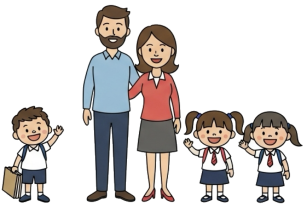
Question More, Action Knowledge.
Remember, at QMAK, we don’t just teach; we empower. We don’t just inform; we inspire. We don’t just question; we act. Become a Gold Member, and let’s unlock your child’s full potential, one question at a time.
![]() In the pursuit of self-mastery, individuals often face numerous obstacles that hinder their progress and prevent them from reaching their full potential. Among these challenges, cognitive biases and harmful emotional algorithms stand out as particularly pervasive and difficult to recognize. At QMAK, we believe that by raising awareness of these mental barriers and providing strategies to overcome them, we can empower individuals to achieve greater self-mastery and lead more fulfilling lives.
In the pursuit of self-mastery, individuals often face numerous obstacles that hinder their progress and prevent them from reaching their full potential. Among these challenges, cognitive biases and harmful emotional algorithms stand out as particularly pervasive and difficult to recognize. At QMAK, we believe that by raising awareness of these mental barriers and providing strategies to overcome them, we can empower individuals to achieve greater self-mastery and lead more fulfilling lives.
The Desire to Be Right: A Pervasive Cognitive Bias
One of the most common and hard-to-spot cognitive biases is the desire to be right (confirmation bias). This bias can prevent people from objectively evaluating information and lead to flawed decision-making. When individuals are driven by the need to be right, they may ignore evidence that contradicts their beliefs, dismiss alternative perspectives, and cling to their preconceived notions, even in the face of compelling contradictory information.
To overcome this bias, it is essential to cultivate a mindset of intellectual humility and openness. By actively seeking out diverse viewpoints, engaging in self-reflection, and being willing to question one’s own assumptions, individuals can develop a more balanced and objective approach to decision-making. Embracing the idea that being wrong is an opportunity for growth and learning, rather than a threat to one’s self-image, is a crucial step in mastering this cognitive bias.
The Illusion of Control: Overestimating Our Influence
Another significant cognitive bias that can hinder self-mastery is the illusion of control. This bias causes people to overestimate their control over their circumstances and attribute unrelated outcomes to their actions. When individuals believe they have more control than they actually do, they may develop a false sense of confidence in predicting desired outcomes, leading to disappointment and frustration when reality fails to match their expectations.
To combat the illusion of control, it is important to recognize the role of external factors and random chance in shaping our lives. By adopting a more realistic and humble perspective on personal control, individuals can focus their energy on areas where they can make a genuine impact while accepting the uncertainties and limitations inherent in life. Cultivating a growth mindset, which emphasizes learning and adaptation in the face of challenges, can also help individuals navigate the complexities of life with greater resilience and adaptability.
Negative Automatic Thoughts: Harmful Cognitive Algorithms
In addition to cognitive biases, negative automatic thoughts pose a significant barrier to emotional self-mastery. These thoughts are habitual interpretations of patterns in people’s experiences and are often inaccurate representations of reality. Essentially, these automatic negative thoughts function as harmful cognitive algorithms that impede happiness and prevent individuals from achieving emotional well-being.
All-or-Nothing Thinking: One common type of negative automatic thought is all-or-nothing thinking, which refers to the tendency to think in extremes, such as “always” and “never,” without considering the nuances and degrees in between. This binary approach to thinking can lead to a distorted perception of reality, where individuals fail to recognize the complexity and variability of life experiences.
Overgeneralization: Another prevalent negative automatic thought pattern is overgeneralization, where individuals make broad, unfounded assumptions based on limited specific incidents. This can lead to a skewed understanding of the world and one’s place in it, as well as a tendency to catastrophize minor setbacks or challenges.
Mental Filtering: Mental filtering, which involves focusing solely on negative details while ignoring the bigger picture, is another key negative automatic thought pattern. This selective attention to negativity can lead to a distorted and pessimistic perception of situations and oneself, hindering personal growth and emotional well-being.
Strategies for Overcoming Negative Automatic Thoughts
To overcome negative automatic thoughts and cultivate emotional self-mastery, individuals can employ various strategies:
Conclusion
The path to self-mastery is a lifelong journey that requires continuous self-reflection, learning, and growth. By recognizing and addressing the impact of cognitive biases and negative automatic thoughts, individuals can unlock their full potential and lead more fulfilling lives. At QMAK, we are committed to providing the tools, resources, and support necessary to help individuals navigate this transformative process.
Through our innovative courses and engaged community, we empower learners to question their assumptions, challenge their limiting beliefs, and cultivate a mindset of openness, resilience, and growth. By embracing the QMAK philosophy of “Question More, Action Knowledge,” individuals can develop the self-awareness, cognitive flexibility, and emotional mastery necessary to thrive in an increasingly complex world.
As we continue to explore the frontiers of personal development and self-mastery, let us remain committed to the ongoing process of self-discovery, learning, and transformation. Together, we can create a world where individuals are empowered to overcome their mental barriers, realize their full potential, and lead lives of purpose, passion, and fulfillment.

Remember, at QMAK, we don’t just teach; we empower. We don’t just inform; we inspire. We don’t just question; we act. Become a Gold Member, and let’s unlock your child’s full potential, one question at a time.